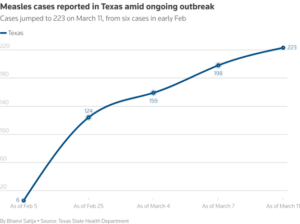Measles is not just a childhood inconvenience – it’s a serious, highly contagious disease that can cause severe complications like pneumonia, brain swelling (encephalitis), and even death. It spreads rapidly through coughing and sneezing, making it especially dangerous in unvaccinated populations where outbreaks can spread like wildfire. While the measles vaccine has been highly effective in reducing cases, the recent resurgence of the disease is a serious concern. Measles is particularly dangerous for young children, pregnant women, and those with weakened immune systems. Many of us in the public health space are very concerned with the recent measles outbreak!
The US has worked tirelessly to eliminate measles after the introduction of the measles vaccine in 1963. By 2000, the Centers for Disease Control and Prevention (CDC) declared that measles had been eliminated from the country, meaning that there was no continuous transmission of the disease (CDC, 2000). But here we are again, in 2025, facing a concerning rise in measles cases. The CDC reported that, as of March 13, 2025, 301 confirmed cases of measles have been reported across 15 states, including Texas and New Mexico. Texas alone has seen a dramatic spike; with the majority of cases among children under 17, many of whom were unvaccinated (CDC, 2025).
1963. By 2000, the Centers for Disease Control and Prevention (CDC) declared that measles had been eliminated from the country, meaning that there was no continuous transmission of the disease (CDC, 2000). But here we are again, in 2025, facing a concerning rise in measles cases. The CDC reported that, as of March 13, 2025, 301 confirmed cases of measles have been reported across 15 states, including Texas and New Mexico. Texas alone has seen a dramatic spike; with the majority of cases among children under 17, many of whom were unvaccinated (CDC, 2025).
This alarming rise in cases has triggered widespread concern, especially after Robert F. Kennedy Jr.’s appointment as Secretary of Health and Human Services. Known for his vocal opposition to vaccines, Kennedy’s stance has been widely criticized by public health experts. As The Washington Post pointed out in a recent article, his anti-vaccine views have contributed to the spread of dangerous misinformation, which many believe is fueling the current rise in vaccine-preventable diseases like measles (The Washington Post, 2025).
Dr. Lanre Falusi, a pediatrician at Children’s National Hospital and a member of the hospital’s Child Health Advocacy Institute, submitted an op-ed to The Washington Post, emphasizing the critical need to combat vaccine hesitancy and protect children from preventable diseases like measles. She submitted the following commentary:
A routine part of my job as a pediatrician is to answer common questions from parents of young children. For the first time in my nearly 20 years of being a doctor, parents are now anxiously asking whether vaccines will still be available when their babies need them.
As noted in the Feb. 28 news article ‘Meeting that helps prep annual flu vaccine is canceled,’ vaccine access is under threat. Disinformation and misinformation about vaccine safety are rampant. Key meetings that help companies determine which vaccines for strains of flu and RSV, or respiratory syncytial virus, to produce for the next fall and winter have been postponed or canceled. This worries me.
These recent actions have led to families—already overwhelmed with the demands of parenting—now facing new fears about their ability to protect their children from preventable and potentially deadly illnesses. Vaccines undergo rigorous testing before approval to ensure they are safe and effective. But without clear, consistent guidance and messaging—and with the flood of misleading information online—this isn’t widely understood.
Vaccines keep our communities healthy, but only if enough people are able to access them. Pediatricians are ready to partner with policymakers to ensure we remain focused on the well-being of children and families. Parents need to know that policy decisions will be informed by settled science, not confusion and conspiracy theories.
By advocating for vaccination, Dr. Falusi is playing a key role in keeping children safe and preventing outbreaks of preventable diseases. It’s critical that we don’t lose the ground we’ve fought so hard to gain in the battle against measles.
Learn more about measles vaccination here.
Sources:
- Centers for Disease Control and Prevention (CDC). (2000). “Measles, Rubella, and Congenital Rubella Syndrome—United States, 2000.” Morbidity and Mortality Weekly Report (MMWR).
- Centers for Disease Control and Prevention (CDC). (2025). “Measles Cases in the United States.” CDC.
- The Washington Post. (March 17, 2025). “After CDC pick is abruptly yanked, worry over U.S. measles messaging remains.” Washington Post. ” The Washington Post.
Header image by Drazen Zigic on Canva
About the author
Director of The Child Health Data Lab within the Child Health Advocacy Institute at Children's National Hospital




